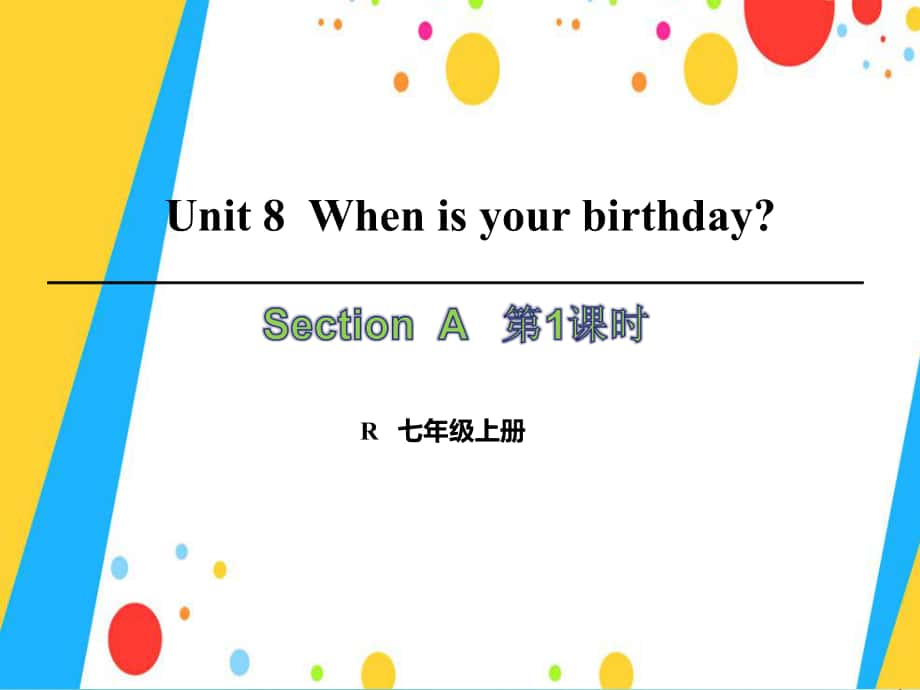《七年級英語上冊 Unit 8 When is your birthday(第1課時(shí))Section A(1a-2e) (新版)人教新目標(biāo)版》由會員分享���,可在線閱讀���,更多相關(guān)《七年級英語上冊 Unit 8 When is your birthday(第1課時(shí))Section A(1a-2e) (新版)人教新目標(biāo)版(31頁珍藏版)》請?jiān)谘b配圖網(wǎng)上搜索���。
1、R 七年級上冊Unit 8 When is your birthday?Lead-in When is your birthday?New words 1. month _2. January _3. February _4. March _ 5. April _6. May _ 月���;月份月���;月份一月一月二月二月三月三月四月四月五月五月7. June _8. July _ 9. August _10. September _11. October _12. November _13. December _六月六月七月七月八月八月九月九月十月十月十一月十一月十二月十二月1aListen and
2、repeat.1. January 2. February3. March 4. April5. May 6. June7. July 8. August9. September10. October11. November12. December1bListen and number the conversations 1-3.A: When is your birthday, Linda?B: My birthday is on May 2nd.A: When is your birthday, Mary?B: Its on January 5th.A: When is your birt
3���、hday, Mike?B:My birthday is on June 3rd.1231cPractice the conversations above with your partner. Then make your own conversations.When is your birthday, Linda?My birthday is on May 2nd.When is your birthday, Mary?Its on January 5th.When is your birthday, Mike?My birthday is on June 3rd.Language poin
4���、ts1. When is your birthday, Linda? 琳達(dá),你的生日是什么時(shí)候���?琳達(dá)���,你的生日是什么時(shí)候? when是疑問副詞���,意為是疑問副詞���,意為“什么時(shí)候什么時(shí)候”���,引導(dǎo),引導(dǎo)特殊疑問句���。特殊疑問句。 句式是句式是 “When+一般疑問句���?一般疑問句���?”,when可以可以對年���、月���、日和時(shí)刻提問。對年���、月���、日和時(shí)刻提問���。When do you get home?你什么時(shí)候到家?你什么時(shí)候到家���?At about six oclock.大約六點(diǎn)���。大約六點(diǎn)。when與與what timewhenwhat time意為意為“什么時(shí)候什么時(shí)候”, 可以對年���、月���、日以及可以對年、月���、日以
5���、及時(shí)刻進(jìn)行提問或者詢問某一動作發(fā)生的時(shí)時(shí)刻進(jìn)行提問或者詢問某一動作發(fā)生的時(shí)間間, 回答時(shí)常用介詞回答時(shí)常用介詞at, in, on等組成的表等組成的表示時(shí)間的介詞短語。示時(shí)間的介詞短語���。意為意為“幾點(diǎn)幾點(diǎn)”, 用于詢問具體的時(shí)間用于詢問具體的時(shí)間, 如幾如幾點(diǎn)幾分點(diǎn)幾分, 通常直接回答某個(gè)時(shí)間點(diǎn)���。通常直接回答某個(gè)時(shí)間點(diǎn)���。2.My birthday is on May 2nd. 我的生日是在我的生日是在5月月2日。日���。(1) 表示日期時(shí)表示日期時(shí), 月份的首字母必須大寫月份的首字母必須大寫, 2nd是序是序 數(shù)詞數(shù)詞second的簡寫的簡寫, 用來表示順序用來表示順序, 表示年���、月、表示年���、月���、
6���、 日時(shí)日時(shí), 年月年月用用基數(shù)詞表基數(shù)詞表示示, 日日通常用通常用序數(shù)詞序數(shù)詞表示���。表示。(2) 當(dāng)日期具體到某天時(shí)當(dāng)日期具體到某天時(shí), 用介詞用介詞on���。介詞介詞on, in, at的區(qū)別的區(qū)別2aListen and repeat.1st2nd3rd4th5th6th7th8th9th10th11th12th13th14th15th16th17th18th19th20th21st22nd23rd24th25th26th27th28th29th30th31st2bListen and circle the numbers you hear in 2a.1st2nd3rd4th5th6th7t
7���、h8th9th10th11th12th13th14th15th16th17th18th19th20th21st22nd23rd24th25th26th27th28th29th30th31st2cListen again. Match the names, months and dates.Name Month DateAlice July 4thFrank August 22ndEric January 5thJane September 17thTalk about the childrens birthdays in 2c. Then ask your partner about the
8���、birthdays in his or her family.2d A:When is Alices birthday? B:Her birthday is on September 5th. A:When is your fathers birthday? B:His birthday is on _.Language points1.When is Alices birthday?艾麗斯的生日是什么時(shí)候?艾麗斯的生日是什么時(shí)候���?Alices是是Alice的名詞所有格形式���,意為的名詞所有格形式,意為“艾麗斯艾麗斯的的”���,名詞所有格表示人或物的所屬關(guān)系���,在句,名詞所有格表示人或物的所屬關(guān)系���,在
9���、句中作定語或表語。中作定語或表語���。This is Johns ruler.這是約翰的尺子���。這是約翰的尺子���。名詞所有格的構(gòu)成有三種:名詞所有格的構(gòu)成有三種:s所有格所有格,of所有所有格格和和雙重所有格雙重所有格���。(1)s所有格的構(gòu)成所有格的構(gòu)成: 一般情況下���,在詞尾加一般情況下,在詞尾加s���。 例如例如: Jims friend 吉姆的朋友吉姆的朋友 以以s結(jié)尾的復(fù)數(shù)名詞���,在詞尾加結(jié)尾的復(fù)數(shù)名詞,在詞尾加���。 例如例如: the workers leader 工人們的領(lǐng)導(dǎo)工人們的領(lǐng)導(dǎo) 不以不以s結(jié)尾的復(fù)數(shù)名詞,在詞尾加結(jié)尾的復(fù)數(shù)名詞���,在詞尾加s���。 例如例如: childrens rooms 孩子們
10���、的房間孩子們的房間(2)of所有格的構(gòu)成:名詞所有格的構(gòu)成:名詞+of+名詞。名詞���。 the door of our classroom 我們教室的門我們教室的門(3)雙重所有格的構(gòu)成:名詞)雙重所有格的構(gòu)成:名詞+of+名詞���。名詞。 a friend of my sister 我妹妹的一個(gè)朋友我妹妹的一個(gè)朋友 Bill: Hi, Alan. Happy birthday!Alan: Thank you, Bill. Bill: So, how old are you, Alan?Alan: Im twelve. How old are you? Bill: Im thirteen.Alan:
11���、 When is your birthday? Bill: My birthday is in August.Alan: Well, do you want to come to my birthday party? Bill: Oh, yes. When is it?Alan: At three this afternoon. Bill: OK, great. See you! Role-play the conversation.2e1. How old are you? 你多大了你多大了? (1) how old意為意為“多大年紀(jì)多大年紀(jì); 幾歲幾歲”, 用來用來詢問年齡詢問年齡���。 ol
12、d是形容詞是形容詞, 意為意為“歲的歲的”���。其句型結(jié)構(gòu)為���。其句型結(jié)構(gòu)為 “How old + be + 主語主語? ”表示表示“幾歲幾歲/多大了多大了? ” 其同義句其同義句: Whats ones age? (2) 表示年齡常用表示年齡常用“基數(shù)詞基數(shù)詞+year (s) old”, 也可以只也可以只 用基數(shù)詞表示。用基數(shù)詞表示���。Language points “年齡年齡”表示法還有表示法還有: (1) “at the age of +基數(shù)詞基數(shù)詞”或或“at +基數(shù)詞基數(shù)詞”���。 基數(shù)詞后不再加基數(shù)詞后不再加years old, 此短語常作狀語���。此短語常作狀語。 At the age of
13���、eight, he went to America with his parents. (2) “of +基數(shù)詞基數(shù)詞”���。此結(jié)構(gòu)常作后置定語。此結(jié)構(gòu)常作后置定語, 基數(shù)詞后不能接基數(shù)詞后不能接 years old���。 At that time, he was just a boy of sixteen. (3) “基數(shù)詞基數(shù)詞-year-old”���。此結(jié)構(gòu)常用作前置定語。此結(jié)構(gòu)常用作前置定語���。 When he was an eight-year-old boy, he began to make a living. (4) “be in ones + teens / twenties / thir
14���、ties. . . nineties”。 表示表示“在某人十幾歲在某人十幾歲/二十幾歲二十幾歲/三十幾歲三十幾歲九十幾歲時(shí)九十幾歲時(shí)”���。 He was in his fifties. 他五十多歲。他五十多歲���。 (5) “aged +基數(shù)詞基數(shù)詞”���。此結(jié)構(gòu)常用作后置定語���。此結(jié)構(gòu)常用作后置定語。 Mr. Smith, a foreigner aged 30, works in North China. . 單項(xiàng)選擇單項(xiàng)選擇1. is the month between (在兩者之間在兩者之間) July and September. A. May B. August C. June D. Octo
15���、ber2. Lilys birthday isMay 8th. A. onB. inC. atD. forExercise 3. is my birthday. A. October 2thB. 2th October C. 2st OctoberD. October 2nd4. New Years Day is in. A. October B. December C. January D. May5. is Lucys birthday? It is on May 2nd. A. WhatB. WhenC. WhereD. Who. 句型轉(zhuǎn)換句型轉(zhuǎn)換1. Helens birthday i
16���、s on November 26th. (對畫線部分提問對畫線部分提問) Helens birthday? 2. My parents want to go to Beijing. (改為一般疑問句改為一般疑問句) parents want to go to Beijing? When isDo your4. He wants to come to Toms birthday. (改為否定句改為否定句) He to come to Toms birthday. 5. We have lunch at twelve every day. (對畫線部分提問對畫線部分提問) you have lunch every day? doesnt wantWhat time do 同學(xué)們,這一課學(xué)習(xí)的單詞你們都掌握了嗎���?現(xiàn)在大同學(xué)們���,這一課學(xué)習(xí)的單詞你們都掌握了嗎?現(xiàn)在大家來檢驗(yàn)一下���,點(diǎn)擊下面的視頻開始聽寫吧家來檢驗(yàn)一下���,點(diǎn)擊下面的視頻開始聽寫吧!
 七年級英語上冊 Unit 8 When is your birthday(第1課時(shí))Section A(1a-2e) (新版)人教新目標(biāo)版
七年級英語上冊 Unit 8 When is your birthday(第1課時(shí))Section A(1a-2e) (新版)人教新目標(biāo)版

